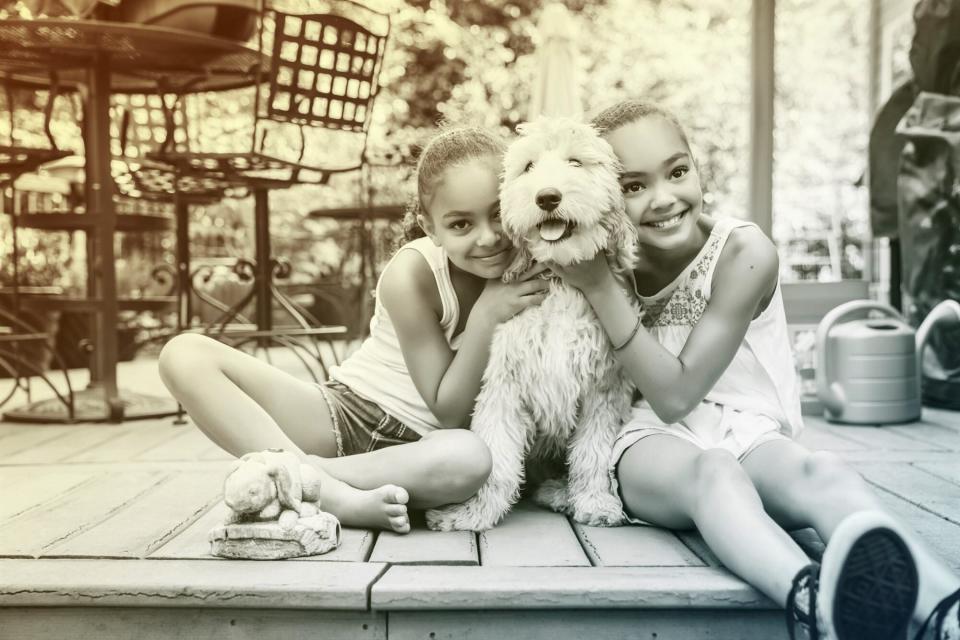Can Dogs and Cats Get COVID-19?

Experts have learned a lot about COVID-19 since the pandemic began, but there are still many unanswered questions. Pet owners, in particular, have wondered if their family's fur babies are susceptible to the virus—especially because scientists say it initially jumped from animals to humans. Here's what we know so far.
Can Pets Get COVID-19?
In March 2020, The Guardian reported that a Pomeranian in Hong Kong tested positive for COVID-19. The dog's owner was also infected, but the dog itself wasn't showing symptoms, according to authorities with the Hong Kong Agriculture, Fisheries, and Conservation Department. The related press release stated that the test results suggested the dog had "a low level of infection" that was "likely to be a case of human-to-animal transmission." At the time, scientists weren't entirely sure what to make of this case.
Vanessa Barrs, who studies diseases in pets at City University of Hong Kong's Jockey Club College of Veterinary Medicine and Life Sciences, explains that the results of all of the tests showed that the dog had a mild infection, which it almost certainly got from its owner. "The tests show that the virus [was] replicating inside of the dog's body, but it is not very good at it, and consequently, it [was] only shedding small amounts of virus in its nose and mouth," she says. Barrs adds that the dog was asymptomatic, meaning that despite having the infection, it had no symptoms and wasn't sick.
Since the first known cases of coronavirus infection in domesticated animals, more recent research suggests that human-to-pet transmission is probably quite common, especially among cat owners. Most cases in pets likely go undetected as they are generally very mild or entirely without symptoms.
Though most dogs and cats that become infected with COVID-19 have an asymptomatic infection, the American Veterinary Medical Association (AVMA) says that it is possible for pets to show some symptoms like fever, shortness of breath, vomiting, diarrhea, and lethargy. The Centers for Disease Control and Prevention (CDC) also acknowledges that while extremely rare, it is possible for pets to experience severe illness as a result of the coronavirus.

Mint Images/Getty Images
Can Cats and Dogs Transmit COVID-19 to Humans?
The simple answer is that it is highly unlikely. The CDC states that while the coronavirus can spread from people to animals during close contact, "the risk of animals spreading COVID-19 to people is low."
There have been isolated reports of certain infected animals (namely mink, hamsters, and deer) spreading the virus to people during close contact, but the CDC states that there is no reason to believe that animals, particularly cats and dogs, play a significant role in spreading COVID-19. Other authorities in the field, including the AVMA and World Organization for Animal Health (OIE), support this view.
To become infected with COVID-19, you have to be exposed to a certain dose of the virus, says Barrs. When an animal is shedding just a tiny amount of virus, it means they are unlikely to be contagious. She adds that when a virus doesn't replicate very well in an animal—as appears to be the case with the coronavirus—no onward transmission occurs. That is to say that an animal being infected is not the same as it being contagious.
J. Scott Weese, a professor at the University of Guelph's Ontario Veterinary College who studies zoonotic disease (disease spread between animals and people), says that researchers believe COVID-19 likely behaves like human flu in pets. "We can occasionally pass human flu to dogs," notes Weese. "They can get sick, but it's not their flu virus, so we assume they are 'dead end' hosts, meaning they don't pass it on any further."
The bottom line: The COVID-19 pandemic is being driven by human-to-human transmission of COVID-19—not animal-to-human spread—so there is no need to be fearful of spending time with furry friends.
Precautions for Pet Owners
While cats and dogs pose little to no infection risk to humans, our coronavirus infections can pose a small risk to them. "For safety, people should avoid close contact with their pets if they are feeling sick, in case they might transmit COVID-19 to their pet," advises Barrs. "If you think you might have COVID-19, don't kiss, cuddle, or sleep with your pet during the period of your illness. You can take your dog for a walk, as long as you are taking normal safety precautions around other people, such as social distancing."
The CDC echoes this guidance, encouraging anyone who is sick to limit contact with their pet. Ideally another member of the household will step in, but if this is not possible, the CDC urges sick pet owners to wash their hands before and after they interact with pets, avoid sharing food, and wear a face mask.

